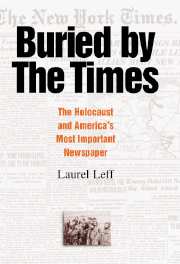Book contents
- Frontmatter
- Dedication
- Contents
- Acknowledgments
- Note Abbreviations
- Introduction: “Last Voice from the Abyss”
- PART I 1933—1941
- PART II 1942—1945
- 5 “To Awaken the Conscience of Christendom”: Pressure to Publicize the First News of the Extermination Campaign
- 6 “Amidst the Advertisements on Page 19”: Placement Decisions and the Role of the News Editors
- 7 “All Jews Are Not Brothers”: The Publisher's Fight with Zionists
- 8 “The Semitic Question Should Be Avoided”: German Atrocities and U.S. Government Propaganda
- 9 “Final Phase of Supreme Tragedy Has Begun”: The War Refugee Board and the Destruction of Hungary's Jews
- 10 “Political Prisoners, Slave Laborers, and Civilians of Many Nationalities”: The Liberation of the Concentration Camps
- 11 “Lessons from the Hitler Tragedy”: The Publisher and the Aftermath of War
- Conclusion: “The Horrible Story Was Not Told”
- Appendix A Key Individuals
- Appendix B Key Institutions
- Appendix C List of Front-Page Stories
- Notes
- Index
9 - “Final Phase of Supreme Tragedy Has Begun”: The War Refugee Board and the Destruction of Hungary's Jews
Published online by Cambridge University Press: 05 February 2015
- Frontmatter
- Dedication
- Contents
- Acknowledgments
- Note Abbreviations
- Introduction: “Last Voice from the Abyss”
- PART I 1933—1941
- PART II 1942—1945
- 5 “To Awaken the Conscience of Christendom”: Pressure to Publicize the First News of the Extermination Campaign
- 6 “Amidst the Advertisements on Page 19”: Placement Decisions and the Role of the News Editors
- 7 “All Jews Are Not Brothers”: The Publisher's Fight with Zionists
- 8 “The Semitic Question Should Be Avoided”: German Atrocities and U.S. Government Propaganda
- 9 “Final Phase of Supreme Tragedy Has Begun”: The War Refugee Board and the Destruction of Hungary's Jews
- 10 “Political Prisoners, Slave Laborers, and Civilians of Many Nationalities”: The Liberation of the Concentration Camps
- 11 “Lessons from the Hitler Tragedy”: The Publisher and the Aftermath of War
- Conclusion: “The Horrible Story Was Not Told”
- Appendix A Key Individuals
- Appendix B Key Institutions
- Appendix C List of Front-Page Stories
- Notes
- Index
Summary
The War Refugee Board's (WRB's) ability to save Jews and the Times' willingness to trumpet it were quickly tested. On March 20, 1944, 2 months after the WRB's founding, the Germans marched into Hungary. Until then, the 800,000 Jews who lived in Hungary or had found shelter there, had been relatively secure. The fascist Horthy government had allied itself with the Germans, enacted anti-Semitic laws, forced Jews into work battalions, and pushed thousands of them into Nazi territory in Eastern Poland. But the Hungarians had not deported hundreds of thousands to their deaths in Poland. With the German occupation, that was about to change.
In the month before the invasion, as WRB geared up its operation, the U.S. government seemed more willing to acknowledge the singular tragedy of European Jewry. In its initial announcement, the WRB had been careful to refer to “Jews and other victims of Nazi aggression,” and had continued to prefer the term “refugees,” as its very name indicated. The board's director, John Pehle, changed all references from “Jews” to “refugees” in a draft memorandum directed to State, for example, and removed a request for a breakdown between Jews and non-Jews. But internally WRB officials signaled that their mission was to save Jews, and it was important to emphasize that. “The Nazis are singling out these people for murder solely because they are Jews,” Josiah DuBois wrote in a February 22 memo. “We must make certain that we also single out our condemnation of this nefarious crime.”
- Type
- Chapter
- Information
- Buried by the TimesThe Holocaust and America's Most Important Newspaper, pp. 265 - 293Publisher: Cambridge University PressPrint publication year: 2005



